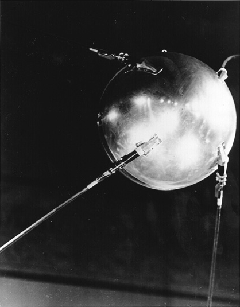Happy Birthday Sputnik
Air Date: Week of September 28, 2007

Sputnik (Courtesy of the State of Indiana)
Fifty years ago, Soviet scientists launched Sputnik 1, the first artificial satellite in history. The tiny sphere orbited the globe for just a few months but changed the world forever. Host Bruce Gellerman talks with Roald Sagdeev, director emeritus of the Soviet Institute for Space Research in Moscow.
Transcript
[BEEPING SOUND]
GELLERMAN: On October 4th 1957, this sound marked a new era in space science.
And set off alarms in the United States. It was fifty years ago, that the Soviet Union launched Sputnik 1. It was the world’s first artificial satellite. The tiny aluminum sphere with four whisker-like antennas sent the beep-beep-beep signals that were picked up by ham radio operators around the planet. Joining me to discuss Sputnik 1 is Roald Sagdeev, Director Emeritus of the Soviet Institute for Space Research in Moscow. Professor Sagdeev, it’s a real pleasure.
SAGDEEV: I’m happy to be part of your program.
GELLERMAN: What does Sputnik mean?
SAGDEEV: You mean the meaning of the word ‘sputnik’ in Russian language?
GELLERMAN: Yes.
SAGDEEV: Its literal translation is ‘travel companion.’
GELLERMAN: What was the significance of Sputnik in your mind?
SAGDEEV: It depends on what a particular person is doing. I’m a scientist so I’m really impressed with completely new horizons opened for scientists. It started with the possibility to study what’s happening above atmosphere, then the moon; solar system. And astronomers suddenly discovered that the sky as a universe in a completely new different way. And in the end, with all of these new discoveries, the basic fundamental physics was enriched tremendously.
GELLERMAN: We responded by starting a space-race and I’m wondering was the Soviet Union in the race, too?
SAGDEEV: You know, I think first of all it was a missile race. And then when space spectaculars became so much influential—impressive, you know, for the rest of the world—then both countries suddenly found themselves in competition of who would provide more spectacular firework in space.
GELLERMAN: I found it interesting that the rocket that was used to launch Sputnik, the R7, is still being used by Russians today.

Sputnik (Courtesy of the State of Indiana)
GELLERMAN: What about the Russian space program now?
SAGDEEV: First of all what happened, the overall budget for space program shrank tremendously. If I said ten times it would not be overestimation. So, much fewer launches and very few new technological developments. And the second thing which is happening—Russia is trying to sell whatever it inherited from Soviets—same Soyuz rockets, descendants of R7, is one of the objects in trade also. And also some other launchers.
GELLERMAN: So Professor Sagdeev, how are you going to commemorate Sputnik 1?
SAGDEEV: I will go back to Moscow for a few days and there is a big conference organized by my former institute of Space Research in Moscow. I served as the director for 15 years. And it will be a big international gathering so we will see what we have learned over the period of 50 years and try to figure out what’s going to happen in future.
GELLERMAN: Well professor I want to thank you very much.
SAGDEEV: Thank you for your interest.
GELLERMAN: Today, Roald Sagdeev is a distinguished professor of physics at the University of Maryland. Well 50 years ago in 1957, Wham-O produced the first Frisbee. Ford introduced the Edsel. The “Cat in the Hat” was published. Velcro was patented. The first bucket of Kentucky Fried Chicken was sold. And while Sputnik was spinning the globe, this 45 was spinning to the top of the charts.
Living on Earth wants to hear from you!
Living on Earth
62 Calef Highway, Suite 212
Lee, NH 03861
Telephone: 617-287-4121
E-mail: comments@loe.org
Newsletter [Click here]
Donate to Living on Earth!
Living on Earth is an independent media program and relies entirely on contributions from listeners and institutions supporting public service. Please donate now to preserve an independent environmental voice.
NewsletterLiving on Earth offers a weekly delivery of the show's rundown to your mailbox. Sign up for our newsletter today!
 Sailors For The Sea: Be the change you want to sea.
Sailors For The Sea: Be the change you want to sea.
 The Grantham Foundation for the Protection of the Environment: Committed to protecting and improving the health of the global environment.
The Grantham Foundation for the Protection of the Environment: Committed to protecting and improving the health of the global environment.
 Contribute to Living on Earth and receive, as our gift to you, an archival print of one of Mark Seth Lender's extraordinary wildlife photographs. Follow the link to see Mark's current collection of photographs.
Contribute to Living on Earth and receive, as our gift to you, an archival print of one of Mark Seth Lender's extraordinary wildlife photographs. Follow the link to see Mark's current collection of photographs.
 Buy a signed copy of Mark Seth Lender's book Smeagull the Seagull & support Living on Earth
Buy a signed copy of Mark Seth Lender's book Smeagull the Seagull & support Living on Earth

